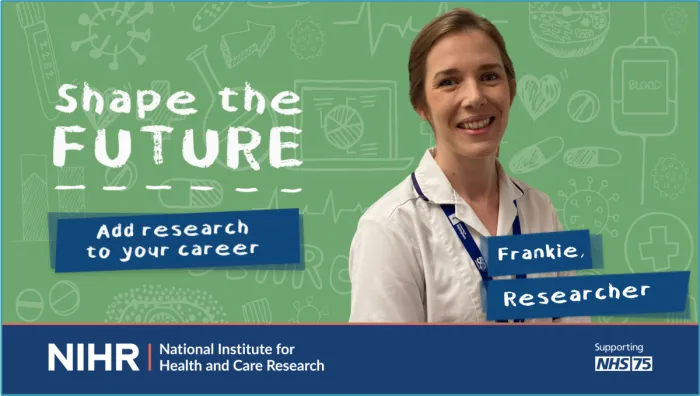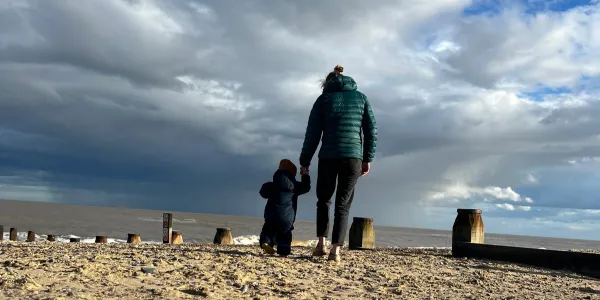
I started my started PhD on 1st October, 2020, and a year to the day I went on maternity leave. A month later Otto was born. I always knew that I wanted to be a working mum, I have always been maternal. It wasn’t straight forward though, we had IVF which was incredibly challenging and is why we knew we couldn’t wait.
In terms of timing, I was very lucky that it fell at a time when a break was suitable. One week before leaving for maternity leave, I disseminated a survey for my PhD which required waiting time for responses. Equally, the qualitative data was collected for the research study in which my colleagues were due to analyse in my absence. I did some keeping in touch days which were important because I got to be professional me again. Other mothers I met were really dreading going back to work, but I was looking forward to enjoying the two parts of my life.
A year later, I returned to the start of the new work package in the research study and data was ready to analyse for my PhD. Transitioning back from maternity leave was easier than expected, I was ready to start using my brain academically again and the research team and supervisors were incredibly supportive.
Challenges:
- Establishing a routine: It took a good couple of months to really nail a routine.
- Managing mental load: The main challenge was the mental load of making sure everything was organised at home and work, this took time until a routine was established, the ability to be flexible with home working helped immensely.
Making it work:
- Job flexibility: What helps is that my job doesn’t really have a routine as such. It doesn’t have the time restrictions that other jobs have. I was also able to reduce my hours to spend more time with Otto.
- Working from home: I work at home for two to three days a week, which means I can walk Otto to nursery.
- Shared parenting responsibilities: My husband has flexibility thanks to having his own business. We’re a partnership, we parent far more equally than a lot of people I see, he is a wonderful Dad.
- Team support: Having a really supportive manager and supervisors has been invaluable.
Advice to others
Going on maternity leave isn’t a barrier to being a researcher. In terms of what I would say to researchers also wanting to start a family, I would say ‘go for it’, because there is nothing better. It’s a decision that will change your life completely, whereas jobs will come and go and as much as I love my job, for me family is everything and I wouldn’t have changed anything to have Otto. You can have both. I think my main tip would be to be open with your supervisors about how you are managing.

An interest in science and sport
I have always been into science and sport. There was a careers day at the school I attended in Norfolk and they asked you to type into the computer what you really liked. I liked sport and science and the computer came back with physiotherapy. I was like, oh what’s that? I looked into it and literally from that day onwards, I was like, ‘I want to be a physiotherapist’. I was 13 and I never looked back.
For my Year 10 work experience, I worked in a physiotherapy unit. Literally, it was like I had a single-minded ambition, that’s what I going to be.
Specialising in stroke physiotherapist
I qualified in 2008 from the University of Birmingham as a physiotherapist. I enjoyed my neuro placement at university and eventually after jobs in Milton Keynes and Oxfordshire I moved to Richmond and worked in a neuro outpatient unit and neuro community unit, which involved a bit of stroke care. I moved to Nottingham, worked in the community stroke team and then got a job in the rehabilitation unit treating severely disabled stroke patients before moving to my current clinical role on the acute stroke wards.
Physio is so important for stroke survivors. It’s making life worth living. Whether that’s helping the complex stroke patients with pain and being able to sit to eat properly or helping those who are re-learning to walk or being able to use their limbs to gain some more independence. It’s about giving people back their movement. It got very personal in 2019 when my Grandma had a severe stroke, seeing things from a different perspective.
Pathway to PhD
I did the Bronze Award in 2016/17 because I was looking for something new in my work. It turned out to be my pathway to my PhD. It’s all down to the NIHR because the Bronze Award was such a great springboard to dip your toe into research.
I really enjoyed it, it sparked my interest and was such a wonderful taster, and from that they recommended you went onto the Masters in Research Methods (MaRM), which again was that classic pathway which they put out in the East Midlands.
After doing the Bronze, I did the MaRM, which was a whole year out of clinical practice. Then I did my silver which again is part of the conveyer belt they put out for you which is just wonderful and that formulates the pitch for your PhD. The Silver Award is just a few days a week so I could work with it with my clinical practice. I ended up applying for three PhDs and I got the third one. I was prepped and carried across the line because I had supervisors during the Silver Award.
I am doing my PhD part time. I’m looking at different configurations of inpatient stroke care focusing on inpatient rehab and am also a co-principal investigator on another research project investigating home-based rehabilitation for survivors of stroke with severe disability.
It is important to me that I also continue to use my clinical skills and maintain close ties with clinical practice so I undertake a weekend shift on the hyperacute stroke unit each month. My PhD is definitely born from being a clinician and seeing services change, not having the research to know which configuration is best for our patients.
Inspiration
I can’t talk about my career in research without mentioning two people Dr Rebecca Fisher and Professor Ian McGonagle.
Dr Rebecca Fisher has been my supervisor since the silver award and continues to be through my PhD. Her expertise in stroke research has been invaluable and she has gone above and beyond to support my clinical academic career.
Professor McGonagle runs the bronze award at the University of Lincoln If you want anyone who lights your fire for research, it’s him. In my interview for the bronze, he’s like ‘what are your aspirations’ and I was like ‘to do my masters’ and he was like ‘no, think bigger, what’s your five-year plan’. And I was like, maybe a PhD, thinking it was the scariest thing in the world’ and he was like ‘no, bigger, you want to be a professor of physiotherapy’. I was like ‘I am only applying for the bronze’, and he was like, ‘yeah, I know but this is the start’. He was right!
